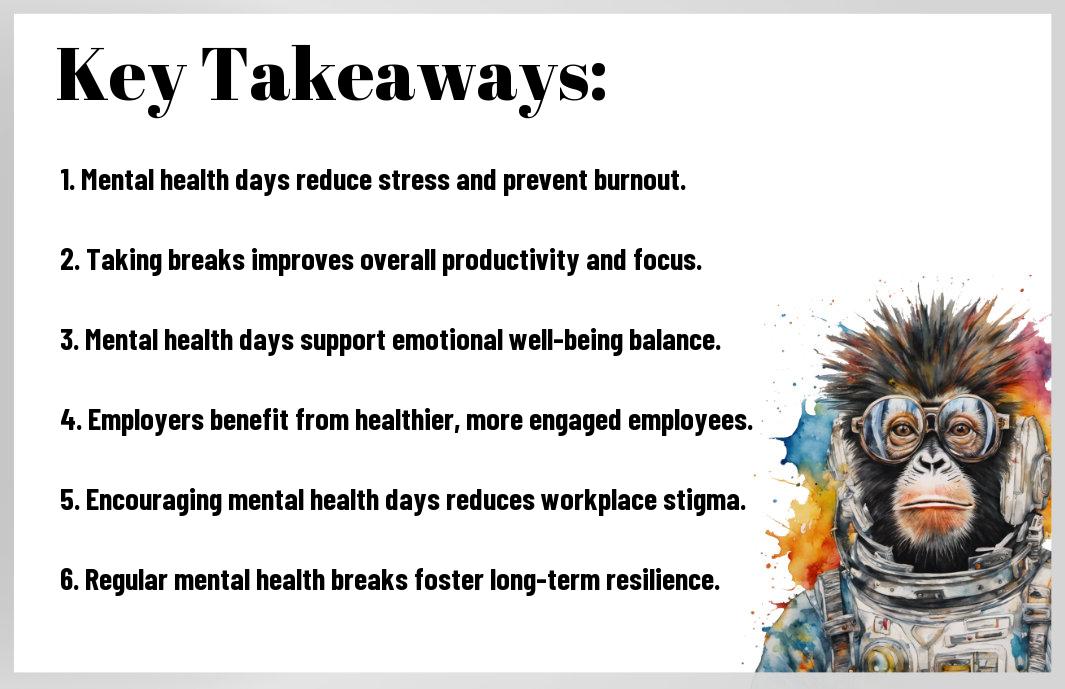There’s a growing recognition of the importance of mental health days in maintaining your overall well-being. These days off from work are not just a luxury; they serve as a necessary reset for your mind, allowing you to recharge and alleviate stress and burnout. Neglecting your mental health can lead to long-term consequences, affecting your productivity and happiness. This blog post will explore the various benefits of taking mental health days and provide you with actionable strategies to incorporate them into your routine.
Key Takeaways:
- Mental health days provide employees with necessary time to recharge, reducing burnout and enhancing overall productivity.
- Regularly incorporating mental health days into the workplace culture can lead to improved morale and better team dynamics.
- Taking time off for mental wellness can aid in early detection of mental health issues, promoting a healthier work environment.
Understanding Mental Health Days
To prioritize your well-being, it is necessary to understand what mental health days are and how they factor into your overall health. These designated days allow you to step back from daily stresses, providing the necessary time to recharge and process your emotions. Utilizing mental health days empowers you to take control of your mental well-being and create a balanced life.
Definition of Mental Health Days
Days taken off from work or responsibilities specifically to focus on your mental well-being are referred to as mental health days. Unlike traditional sick days, these days acknowledge the significance of emotional and psychological health. This time off encourages you to engage in self-care practices that foster resilience and clarity in your life.
Importance for Overall Well-being
Health is not just the absence of illness; it encompasses emotional, psychological, and social well-being. By recognizing the importance of mental health days, you actively participate in achieving a balanced lifestyle. They are necessary for reducing stress, preventing burnout, and increasing overall productivity. When you prioritize these days, you empower yourself to face challenges with a clearer mind and refreshed spirit, ultimately enhancing your long-term mental health and overall quality of life.

Signs You Need a Mental Health Day
Assuming you are increasingly feeling overwhelmed or unmotivated, it might be time to consider taking a mental health day. Recognizing the signs your body and mind exhibit can help you prioritize your well-being. If you notice persistent fatigue, irritability, or a sense of detachment, these may indicate the need for a break. Taking time off can contribute significantly to your mental health, ensuring you return to work re-energized and focused.
Physical Symptoms
Before you dismiss feelings of exhaustion or discomfort as stress, pay attention to your body. Symptoms like headaches, unexplained aches, or digestive issues can manifest when you’re emotionally drained. These physical signs signal that your mental health is at risk, and it’s vital to respond appropriately by granting yourself a mental health day.
Emotional Warning Signs
Signs that you may need a mental health day often present themselves through emotional distress. At times, you may feel an overwhelming sense of irritability, sadness, or anxiety. These feelings can quickly escalate, interfering with your productivity and relationships. Consider yourself at high risk if you find yourself escalating to anger, feeling hopeless, or lacking interest in activities that once brought you joy. Prioritizing a mental health day can provide you with the necessary space to refocus and rejuvenate your emotional state, enhancing your overall performance and happiness.

Benefits of Taking Mental Health Days
Once again, prioritizing your mental health by taking mental health days can lead to significant benefits that enhance your overall well-being. Time away from daily stressors allows you to recalibrate your mind, making it easier to cope with the challenges you face. By investing in these days, you pave the way for a healthier work-life balance and a more fulfilling life overall.
Enhanced Productivity
Above all, taking mental health days can significantly boost your productivity when you return to work. Recharge your energy and creativity, which in turn leads to better decision-making and innovative solutions. A refreshed mindset enables you to tackle tasks more efficiently, ultimately making you a more effective team member.
Improved Emotional Resilience
Productivity is just one aspect; equally important is the enhanced emotional resilience you gain by taking mental health days. When you allow yourself the time to process feelings and reflect, you develop coping mechanisms that prepare you for future challenges. This resilience helps mitigate stress and anxiety, making it easier for you to maintain your focus during difficult times.
Also, investing in your emotional resilience strengthens your ability to adapt to change and overcome adversity. By acknowledging your feelings, you foster a sense of self-awareness that allows you to navigate life’s ups and downs with more confidence. Prioritizing mental health days nurtures your capacity to respond positively to stressors, resulting in improved relationships and a more balanced mindset.
How to Effectively Take a Mental Health Day
For anyone considering the benefits of a mental health day, it’s important to approach it with intent. Make sure to understand The Pros and Cons of Offering Mental Health Days before taking time off. Plan your day to maximize relaxation and rejuvenation, whether by disconnecting from work or engaging in activities that boost your mood. Aligning your plans with your personal needs ensures that your day serves its purpose effectively.
Planning Your Day Off
An effective mental health day starts with thoughtful planning. Identify what you need most: rest, recreation, or simply a break from usual routines. Prioritize those needs and schedule activities accordingly, ensuring that your day is focused on restoring your mental well-being.
Activities to Engage In
Any activities that resonate with you can be beneficial during your mental health day. Taking time for yourself can range from simple pleasures like reading a book to engaging in physical activities like yoga or hiking. Choose what feels right for you.
Mental health days offer a chance to step away from daily responsibilities and refocus on your well-being. Engaging in enriching activities such as practicing mindfulness, trying a new hobby, or taking a nature walk can lead to significant improvements in your mood and outlook. It’s not just about resting; it’s about revitalizing your mind and refreshing your perspective. Prioritize those activities that genuinely resonate with you and contribute positively to your mental state, ensuring that your day off fulfills its intended purpose.
Breaking the Stigma Around Mental Health Days
After years of misunderstanding and neglect, mental health days are beginning to receive the recognition they deserve. By acknowledging the importance of taking time off for your mental well-being, you help dismantle the stigma that surrounds mental health. Instead of viewing these days as a sign of weakness, they should be seen as a necessary part of maintaining your overall health and productivity. Embracing mental health days validates your experiences and encourages others to prioritize their mental well-being too.
Promoting a Supportive Work Culture
Culture plays a critical role in shaping the way mental health is perceived in the workplace. By fostering a supportive environment, you create a safe space where employees feel valued and can prioritize their mental well-being without fear of judgment. A workplace that champions mental health encourages openness, allowing everyone to understand that taking a mental health day is not only acceptable but also vital for long-term productivity and happiness.
Encouraging Open Conversations
After adopting a supportive work culture, it’s vital to encourage open conversations about mental health. This dialogue helps to humanize mental health challenges, making them relatable and less isolating for employees. By normalizing discussions around mental health days, you empower your colleagues to prioritize their well-being without fear. When employees feel supported to express their concerns and needs, it contributes to a positive work environment and can significantly enhance overall morale.
In fact, encouraging open conversations about mental health can lead to improved communication and collaboration within your team. When individuals feel safe to share their struggles, it reduces the sense of isolation that can accompany mental health challenges. This fosters a sense of community and understanding, where support becomes the cornerstone of your workplace culture. Ultimately, promoting these discussions not only benefits individual well-being but enhances creativity and productivity in your organization.
Summing up
Ultimately, prioritizing your mental health by taking Mental Health Days through WorkWell can significantly enhance your overall well-being and productivity. By recognizing that your mental state directly impacts your performance and satisfaction at work, you empower yourself to take proactive steps towards maintaining balance in your life. These days offer a valuable opportunity to recharge, reflect, and reconnect with yourself, ensuring you return to your responsibilities with renewed energy and focus. Embracing this practice is not only beneficial for you but also fosters a healthier workplace culture.
FAQ
Q: What are Mental Health Days and why are they important?
A: Mental Health Days are dedicated time off from work to focus on one’s mental well-being. They serve as a break to recharge and address emotional and psychological challenges. Taking these days can help prevent burnout, reduce stress, and improve overall productivity. By prioritizing mental health, individuals can maintain their emotional balance and come back to work with renewed energy and focus.
Q: How can I tell if I need to take a Mental Health Day?
A: Signs that indicate the need for a Mental Health Day may include feelings of constant fatigue, overwhelming stress, irritability, difficulty concentrating, or a lack of motivation. If you’re experiencing these feelings consistently, it may be beneficial to take a day off to relax and engage in activities that promote well-being, such as spending time in nature, practicing mindfulness, or engaging in hobbies you love.
Q: What should I do during my Mental Health Day?
A: During your Mental Health Day, it’s important to engage in activities that help you relax and rejuvenate. This may include practicing mindfulness or meditation, engaging in physical exercise, exploring creative outlets, or simply taking time to rest and enjoy leisure activities. The goal is to disconnect from work-related stressors and focus on what brings you joy and relaxation, ultimately helping you to return to work feeling refreshed.

Leave a Reply